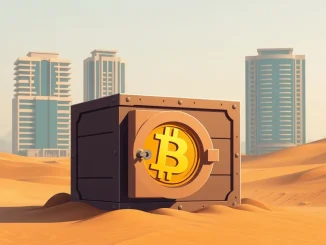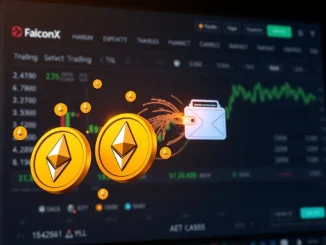
News has emerged regarding the Israeli Air Force conducting a strike in Iran, according to reports from Axios as relayed by Walter Bloomberg on X. This development signals a potential escalation in the ongoing tensions within the region. For many in the digital asset community, the immediate question is: What does this **Israel Iran conflict** mean for the markets we care about? Understanding the potential **Bitcoin price impact** and broader **crypto market volatility** is crucial in these uncertain times.
Understanding the Latest in the **Israel Iran Conflict**
Reports indicate that the Israeli Air Force carried out a strike within Iranian territory. This action follows recent exchanges, marking a significant moment in the simmering conflict between the two nations. The information, initially reported by Axios, was quickly disseminated across financial news channels via sources like Walter Bloomberg, highlighting the speed at which such critical geopolitical news travels.
While details are still emerging, the core event is clear: direct military action has occurred. This kind of development rarely happens in isolation and is often part of a larger, complex dynamic. The global community is watching closely for further reactions and potential escalations.
Why **Geopolitical Tension** Matters for Crypto
It might seem counterintuitive that events in the Middle East directly affect decentralized digital currencies. However, global financial markets are interconnected. Major geopolitical shifts, especially those involving potential conflict or instability in critical regions, tend to increase uncertainty across all asset classes, including cryptocurrencies.
Here’s why **geopolitical tension** is a significant factor for crypto:
- Investor Sentiment: Fear and uncertainty often lead investors to reduce exposure to perceived riskier assets. Crypto, despite narratives of being a safe haven, is still largely viewed as a risk asset by mainstream finance.
- Global Liquidity: Major global events can impact capital flows, potentially reducing the amount of money available to flow into speculative markets like crypto.
- Macro Correlation: In recent years, Bitcoin and other cryptocurrencies have shown increased correlation with traditional markets like stocks (particularly tech stocks). If traditional markets react negatively to geopolitical news, crypto often follows.
- Narrative Shifts: While some argue crypto’s decentralized nature makes it resilient during conflict, others point to its reliance on global infrastructure and investor confidence. Major conflicts test these narratives.
Anticipating **Crypto Market Volatility**
The immediate aftermath of significant geopolitical news is almost always characterized by increased **crypto market volatility**. Prices can swing sharply as traders and investors react in real-time to unfolding events and interpretations of their potential impact.
What kind of volatility might we see?
- Sudden Price Drops: A common initial reaction is selling pressure as some investors panic or de-risk their portfolios.
- Rapid Rebounds: Markets can quickly reverse if the situation de-escalates or if dip buyers step in.
- Increased Trading Volume: Periods of high volatility typically see a surge in trading activity as participants try to capitalize on price swings or exit positions.
- Unpredictable Swings: Unlike fundamental market analysis, geopolitical reactions are often driven by news headlines and emotional responses, making short-term price movements highly unpredictable.
Navigating this environment requires caution and a clear strategy.
The Potential **Bitcoin Price Impact**
As the leading cryptocurrency by market capitalization, Bitcoin’s price often sets the tone for the rest of the market. The **Bitcoin price impact** from the escalating **Middle East conflict** could be significant.
Historically, Bitcoin’s reaction to geopolitical crises has been mixed. Sometimes it has seen inflows as a perceived alternative to traditional finance or as a censorship-resistant store of value. Other times, it has dropped sharply alongside equity markets as part of a broader risk-off move.
In the current climate, given Bitcoin’s correlation with tech stocks and its growing integration into traditional finance, a negative reaction to increased global instability seems a likely possibility in the short term. However, the unpredictable nature of both geopolitics and crypto means other outcomes are possible.
Navigating the **Middle East Conflict** and Market Uncertainty
For cryptocurrency holders, the news from the **Middle East conflict** adds another layer of complexity to market analysis. Here are a few actionable insights:
- Stay Informed, Critically: Follow news from reputable sources, but be wary of hype or FUD (Fear, Uncertainty, Doubt) on social media. Geopolitical situations are fluid.
- Review Your Portfolio: Assess your risk tolerance. If increased volatility makes you uncomfortable, consider adjusting your positions according to your long-term strategy, not based on panic.
- Avoid Emotional Trading: High-pressure situations can lead to impulsive decisions. Stick to a pre-defined plan if you have one.
- Understand Correlation: Recognize that crypto markets are not immune to global macro events, despite the decentralization narrative.
Compelling Summary
The report of an Israeli Air Force strike in Iran is a significant geopolitical event that has the potential to increase global instability. For the cryptocurrency market, this translates to a heightened risk of **crypto market volatility**. Investors should be prepared for potential shifts in the **Bitcoin price impact** and broader market sentiment driven by the escalating **Israel Iran conflict** and overall **geopolitical tension** stemming from the **Middle East conflict**. Staying informed and approaching the market with caution and a clear strategy is essential during these turbulent times.



